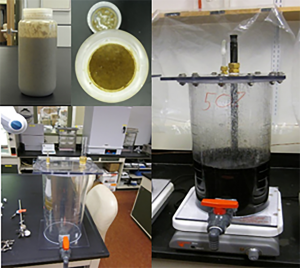I just wanted to thank you and Kennedy & Jenks for your help on our recent Food Waste Codigestion Bench scale study. I understand Food Waste is part of the advanced digestion evaluation that OCSD-Planning Division is overseeing. The project was a great success for OCSD. KJ brought new ideas to the table and thought beyond enhanced gas production through co-digestion. The holistic approach proposed by KJ helped understand the effect of food waste addition not only on gas production but also on digester stability, odor, dewatering and beyond to help OCSD take informed decision. Sometimes more (as in more food waste addition) is not better, and KJ helped us identify the optimum range of food waste addition to obtain best overall benefit to OCSD. The project was completed on schedule and on budget. We are very pleased with the value and quality of the services provided by the KJ team, led by project manager Ganesh Rajagopalan.
In order to maximize the value and energy recovery from waste streams, and to proactively prepare for future regulatory requirements that may divert organic wastes from landfills, OCSD considered adding food waste to its digesters.
 However, due to limited available digester capacity, lack of comprehensive data regarding potential side effects, the District wanted to perform a systematic study prior to implementation of co-digestion program. Most prior co-digestion studies by others addressed only enhancement in gas production due to co-waste (e.g. FOG, food waste) addition. KJ proposed a holistic approach to investigate co-digestion and performed this bench scale study that addressed not only gas production, but also all aspects of solids treatment process including digester stability, toxicity, dewatering, odor and centrate quality. In particular, the study investigated the validity of old paradigms of digester design which received mostly primary sludge and WAS for the evolving practice of adding organic wastes with diverse characteristics. KJ demonstrated that, by adding appropriate amount of food waste, the OCSD digesters can effectively operate at over 50% higher loading VS loading rate (0.187 lb/cu.ft/day) then their then current operating load of 0.12 lb/cu.ft/day. This, in turn, would increase the digester’s capacity to receive more food waste. KJ identified the effect of lower food waste addition (higher odor production) and higher food waste loading (increase in cake solids production) and identified optimum loading rate by also considering the District’s infrastructure improvement requirements. The proposed food waste loading will increase the District’s energy production by 75% with a payback period of approximately four years. ” The OCSD study is the first study which systematically evaluated the overall effect of adding food waste on all solids processing operations ” The addition of recommended amount of food waste (30,000 gpd) will increase gas production by 75% with no net increase in cake solids requiring disposal.
However, due to limited available digester capacity, lack of comprehensive data regarding potential side effects, the District wanted to perform a systematic study prior to implementation of co-digestion program. Most prior co-digestion studies by others addressed only enhancement in gas production due to co-waste (e.g. FOG, food waste) addition. KJ proposed a holistic approach to investigate co-digestion and performed this bench scale study that addressed not only gas production, but also all aspects of solids treatment process including digester stability, toxicity, dewatering, odor and centrate quality. In particular, the study investigated the validity of old paradigms of digester design which received mostly primary sludge and WAS for the evolving practice of adding organic wastes with diverse characteristics. KJ demonstrated that, by adding appropriate amount of food waste, the OCSD digesters can effectively operate at over 50% higher loading VS loading rate (0.187 lb/cu.ft/day) then their then current operating load of 0.12 lb/cu.ft/day. This, in turn, would increase the digester’s capacity to receive more food waste. KJ identified the effect of lower food waste addition (higher odor production) and higher food waste loading (increase in cake solids production) and identified optimum loading rate by also considering the District’s infrastructure improvement requirements. The proposed food waste loading will increase the District’s energy production by 75% with a payback period of approximately four years. ” The OCSD study is the first study which systematically evaluated the overall effect of adding food waste on all solids processing operations ” The addition of recommended amount of food waste (30,000 gpd) will increase gas production by 75% with no net increase in cake solids requiring disposal.

